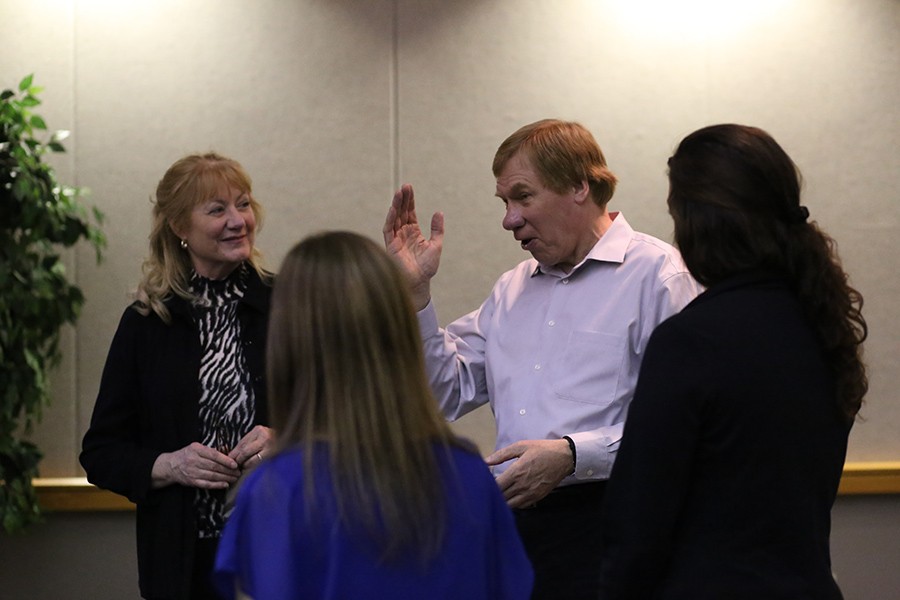Averting Crisis
Instructor of communications Mary Beth Reese (left) and members of the student committee of the event Katie Schmitt, a junior advertising and public relations major (middle) and Natalie Theriac (right), a senior advertising and public relations major, listen as keynote speaker Glen Nowak, Director of the Center for Health and Risk Communication at the University of Georgia, discusses with them after the Social Media Symposium Monday in Carter Hall.
One third of Americans believe that genetically modified mosquitoes caused the Zika virus outbreak in Brazil.
This is false.
“If you want to scare people, say ‘genetically modified,’” Glen Nowak said.
The University of Georgia public relations and advertising professor spoke at “Social Media: Your Crisis Lifeline” at 7 p.m. Monday in Carter Hall.
The speech related to a webinar Nowak and current Centers for Disease Control and Prevention employee Dave Daigle made for the Public Relations Society of America.
Daigle was originally scheduled to co-speak with Nowak, but is currently working in communications on the Zika virus outbreak in Brazil.
His replacement, Kirsten Nordlund, also had to cancel to work on a crisis.
Nowak discussed the advantages and disadvantages of social media during crises as well as how organizations should address the public during crises.
During a health crisis, the average person expects there to be experts who will find a solution right away, the former CDC employee said.
In reality, experts often don’t have a solution ready during a crisis and finding a solution takes a long time with several setbacks, he said.
“The positive thing is the more people who get infected, the more likely we are to find a solution,” he said.
The problem with social media is that anyone can say anything without verifying it first, Nowak said. This is especially problematic for people with personal agendas.
The 2009 H1N1 virus outbreak wasn’t airborne, but pictures of five people in hazmat suits and one man in regular clothes surfaced and people got confused, he said.
“You have to be prepared for what you say not being what people hear,” he said.
People will still worry even after being reassured they’re safe, Nowak said. They’ll wonder who should worry and who isn’t safe.
“You can put ‘new’ in front of anything — detergent, toothpaste — and people will try it,” he said. “The same is not true for flu outbreaks.”
People are apprehensive of new vaccines or cures because they assume they’re not safe, Nowak said.
“People hear ‘new’ and either think ‘novel’ or ‘untested,’” he said.
It’s important to inform the public quickly, he said, but organizations always need to confirm information before releasing it.
One time, the CDC received a report of a patient infected with smallpox, Nowak said.
Smallpox has been eradicated.
The reason the H1N1 crisis went so smoothly was because the CDC initially said they would change their policies as they learned new information, Nowak said. When they did that, no one could hold that against them.
People want to know how bad crises are, he said. The best option organizations have is to release predictions for the best and worst case scenarios.
This is because some people, especially politicians, will try to hold it against organizations when those predictions are wrong, Nowak said.
“Think of a crisis like a marathon and not a sprint,” he said.
Organizations should plan for crises to last several weeks, Nowak said. It’s better to be overly cautious than to expect for everything to solve itself quickly and be wrong.
Using social media to communicate with the public isn’t going to stop an epidemic, he said, but it can minimize the number of people infected.
“Identify potential risks and let people know right away,” he said.
Tell people if there’s nothing they can do to protect themselves, Nowak said. Usually, they can do something small, such as using mosquito repellant in the case of the Zika virus.
Nowak held a Q&A after his speech.
One audience member asked why there was such a big opposition to the term “swine flu” during the H1N1 outbreak.
Pig farmers didn’t want the flu associated specifically with pigs, and in some countries, “swine” is essentially a four-letter word, he said.
H1N1 is also too broad to accurately describe that outbreak, Nowak said.
“H1N1 is a category,” he said. “There are strains of H1N1 every year.”
Another audience member said she believed releasing information caused fewer problems than withholding it.
“I’m not advocating withholding information,” he said. “I’m advocating waiting until you have confirmation.”
Senior public relations and advertising major Elise Weaver said people need to be even more careful with what they say and how they say it on social media.
“It’s crucial that you’re honest and upfront to the public,” the chair of the student committee tasked with planning the symposium said.
Weaver watched Nowak’s PRSA webinar in her Crisis Communication class and got involved in the planning of this symposium last May.
“People need to understand that social media is not only a platform for networking and hanging out with friends,” she said. “It’s also a business tool that should be used meticulously and responsibly.”



